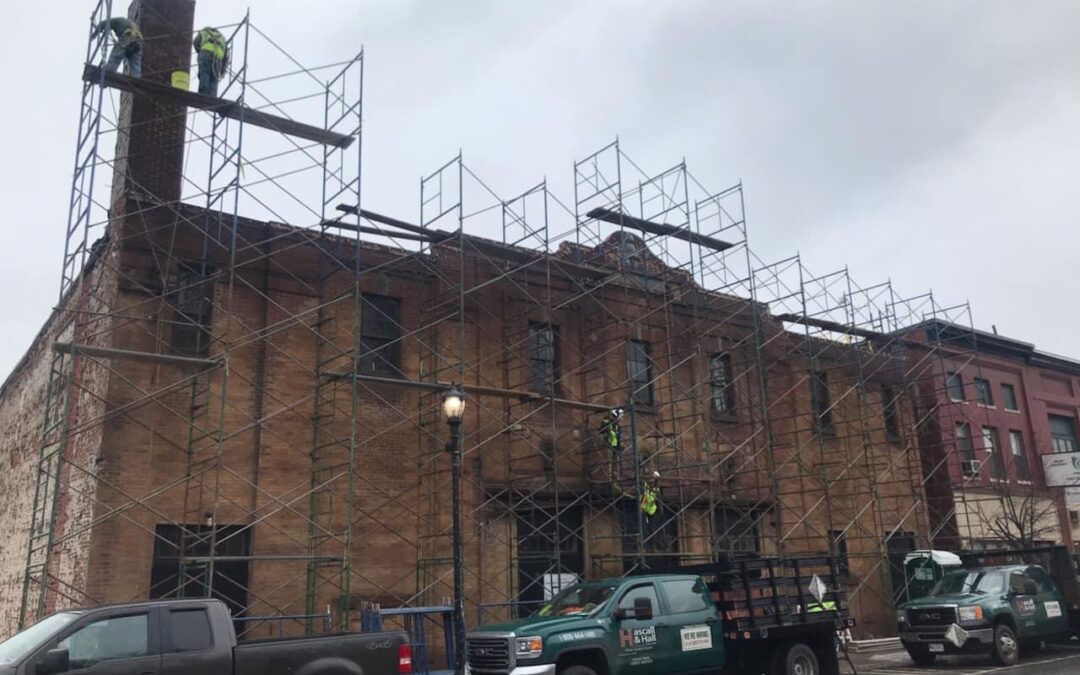
Augusta makes up to $300,000 in city funding available to help Colonial
Theater officials, who said fundraising has been stymied by the coronavirus pandemic, sought release of city money to match grants.
AUGUSTA — City officials have agreed to make up to $300,000 in city money available sooner than planned to provide the Colonial Theater matching funds needed to secure grants.
Theater advocates said it has been a struggle to raise funds during the coronavirus pandemic, so they’ve turned to grant funding as a way to keep the project moving forward. Many of those grants require the funds to be matched with local money, which is why theater officials asked the city to release $40,000 from a $300,000 fund set aside in 2016 by a previous city council to help bring the theater back to life.
“We’ve made great progress but COVID-19 has made private fundraising much slower, and that’s very understandable,” said Andrew Silsby, vice chairman of the theater’s board of directors. “When that happened we turned to grant writing, and we’ve been very successful at getting grants.
“We’d like to use the $40,000 to match the grants we’ve already gotten and to match larger ones we expect to come in,” he added. “This allows the city’s investment to be doubled, and help us be able to continue to restore the building.”
Councilors not only agreed to make $40,000 available, they also voted unanimously to strike an agreement with theater leaders to make all $300,000 available — as needed — as a forgivable loan.
If the project is successful and the theater is restored and reopens, the $300,000 would never have to be paid back. But if the project fails and the theater’s board decides to sell the partially-restored building, any money taken from that amount would have to be paid back to the city.
In 2016, when councilors agreed to set aside the $300,000, they specified the money wouldn’t be paid to the nonprofit group working to restore the theater until the project, estimated to cost as much as $8.5 million, is substantially complete and a certificate of occupancy has been issued.
Mayor David Rollins said at the time councilors wanted to help the theater but didn’t want the city funds, which were left over from the Lithgow Public Library renovation and expansion, to be spent on a private project only to see it fail.
“It is public money for a nonpublic building,” Rollins said. “So it’s not just a black and white issue.”
However, Rollins said members of the 2016 council he spoke to were in favor of the proposed new deal making the $300,000 a forgivable loan to the theater.
He said he doesn’t think there is any other project that has been undertaken that could have more of a positive impact on Augusta than the revitalization of the theater and improvements to the northern end of Water Street.
At-Large Councilor Marci Alexander, who was part of the council that approved setting aside funds for the theater, said she’s in favor of the new plan. She said it protects Augusta’s investment because if the theater project fails, the city could have a lien on the building, which has already received about $1 million worth of improvements.
“I think it’s economic development at its best, and we need economic development, especially during the pandemic,” Alexander said. “Because that gives people hope. And hope is what causes people to keep their businesses going, to fight all the way to get through, so that, on the other side (of the pandemic), these ventures are still going.”
According to documentation provided to councilors by theater leaders, the theater could receive about $55,000 in grants if it comes up with $211,000 in matching funds. Other potential grant applications, with various levels of matching funds, could bring in up to an additional $466,000.
Kathi Wall, interim executive director of the theater, said arts-related groups and businesses are suffering in the pandemic because their sources of income generally rely on people being able to attend large public gatherings. So being able to seek historic preservation grants, which often require a local match, is crucial to keep the Colonial Theater’s restoration moving forward.
“It protects taxpayer money and gives us a little more flexibility in terms of grants,” Wall said. “The other thing is, every one of the city councilors were very supportive of the Colonial project, which goes a long way toward us being able to tap into other sources of money, if people know we have the full support of the city.”
In 2017, councilors narrowly voted to give $30,000 to the theater, from the $300,000, after the project encountered an unexpected expense, to remove environmentally hazardous coal ash from the basement of the theater, which needed to be taken out before the floor project could proceed.
However, City Manager William Bridgeo said theater officials never ended up actually providing an invoice and thus never received the $30,000, which he speculated could have been due in part to changes in the theater’s leadership.
Bridgeo said theater advocates need about $70,000 to match grants the Colonial has received, so the $30,000 that was approved but never given to the theater will be combined with $40,000 requested recently by theater officials, to make those matches.
As the need for more of the $300,000 arises to match grants, Rollins said theater officials would ask for permission to receive more of the forgivable loan funds, which would be paid out as long as the project keeps making progress.
City Attorney Stephen Langsdorf will draft an agreement specifying how the forgivable loan agreement will work.
Story by Keith Edwards, Kennebec Journal
